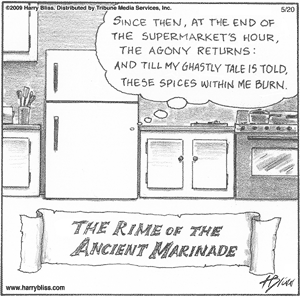When commenting on someone else's blog, keep it brief and to the point. It's their show and their space. If you need to say more, send an e-mail. They might respond. They might even invite you to go ahead and post your comments regardless of length. I have even tighter rules for Facebook comments.
If you need even more space - use you own blog, and tip the original author to your own post as a courtesy.
A little more that a week ago, Michael (may I call you Michael?), posted this simple query:
Question from 60 y.o.: what's best learn to cook book. Not recipe book but teach yrslf book?I responded with two suggestions. As I read through the of the posts though, I had the feeling that the respondents were missing the distinction between a cookbook and a book that that teaches one to cook. But as I did not want to sow the seeds of discord, I decided to send my thoughts in an e-mail to Michael:
Joy is a recipe book. As much as I admire its place in history, and I own threI got a response from Michael and he said that I inspired him to do a blog post on the subject. I am sure I wasn't alone. He did. Please read it here.e different editions, it's the kind of book that got me into trouble the first time I "really" cooked.
I didn't want to get into it on Facebook, but I really get the question. I taught myself how to cook this way. After a disastrous attempt while in law school to impress a redheaded nursing student from Bowling Green with my non-existent cooking skills, I went to a used bookstore in Toledo. I told the lady I did not want a cookbook, but a book that would teach me how to cook. She sold me Mastering 1 and 2, and Pepin's La Technique.
I may not have done a Julie Powell, but I spent years using the basics studied. You don't have to turn pro like me to put those lessons to good use. If someone asked me the question you were asked, the recommendations would be what I put on Facebook: Julia's "The Way to Cook" or Jacques and Julia's "Cooking at Home" Plusses and minuses to each. YMMV.
But, he didn't stop there. He asked about the future of cookbooks, a topic that deserves more than just a blog comment. That's the reason for this post.

Thought 1: All cookbook authors, from the 4 star Chef to the home cook, must be required to read Jacques Pepin's essay The Anatomy of a Recipe from his marvelous Chez Jacques. Others have written of this, but no one else has spoken more eloquently on the difficulty of translating ones own skills and tastebuds in to the printed word. Not to mention the variations in ingredients.
Thought 2: Because of No. 1, the cookbook of the future should have a greater ratio of prose to recipes. You cannot keep reinventing the wheel. Tell me the whys and wherefores of how you chose this particular approach. Talk about variations, and what might cause things to go wrong. Tell how to fix the latter.
Thought 3: Focus on a more narrow topic. The General Purpose cookbooks never die, they just get updated and reprinted. And while you are at it, tell me why I need another book on whatever that topic is.
Thought 4: More Voices. One of things I love about the Jacques/Julia book is their interplay. Their distinct voices can be "heard" (in my head, at least) in the simple colloquy over black vs. white pepper. Now I mean a real collaboration, not just a collection of different cooks' recipes. Think of a joint effort between Michael and Alton. While that is intriguing, I don't think it's sustainable.
Which brings me to my Ultimate Answer to Life, the Universe, and the Future of Cookbooks:
Thought 5: 42

No, it's interactivity, with the collaboration coming from the people who buy the book and are using the recipes. Here is how I see it working, using Michael's Charcuterie as the template.
Sherman, set the wayback machine to 2005. On the day Charcuterie is released a website goes up hosted by the publisher. It is monetized by advertising paid for by the companies listed in the sources section of the book, as well as other retail sources of the equipment needed. KitchenAid any one? This will pay for site administration and initial moderation of the site. Ultimately the authors might find volunteer moderators from friends, food bloggers, or regular posters who exhibit restrained reasoning.
There would be active links to the authors' blogs that show recent entries. While Michael and Brian wouldn't need to participate regularly, a drop by on occasion would be a good thing.
Most important would be the comment threads. There would be a general thread for people to talk about Michael's hair or how cute Brian looks in his Chef whites. The bulk of the threads will be based upon the specific techniqes and the specific recipies contained in the book.
So, if a person (let's call him "Snotty") tried out the recipe for sopressata and the result was perfect but so sour that it was almost inedible (worked well in baked beans though), he could go to the website. Someone else may have had the same problem. Someone may have a solution. You see "Snotty" was comfortable enough to e-mail Bob del Grosso to confirm his suspicions of what went wrong. Most people don't have that option.
The bottom line is that the cookbook of the future won't be just about selling books - it will be about creating a community.
Here endeth the lesson.






